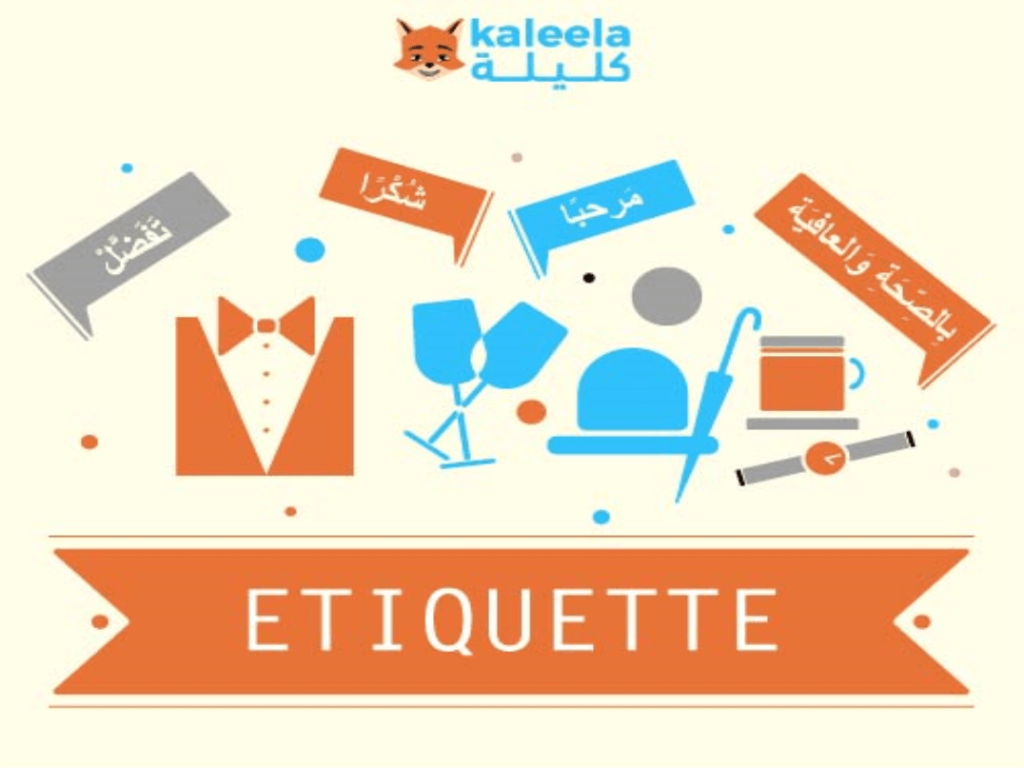Welcome to an essential aspect of understanding Arab culture: etiquette in Arabic! Beyond just speaking the language, knowing the unspoken rules of social interaction can significantly enhance your experience and show deep respect for the people you meet. Arab etiquette is rooted in hospitality, generosity, and strong communal values. This article will guide you through key Arabic culture rules, helping you navigate social situations with confidence and grace.
The Foundation of Etiquette in Arabic Culture: Hospitality and Respect
At the heart of etiquette in Arabic culture lies the concept of ضيافة (Dhiafa – hospitality) and احترام (Iḥtirām – respect). These values permeate almost every social interaction.
- Generosity (كرم – Karam): Arabs are renowned for their generosity. Guests are treated with immense warmth, and offering food, drink, and comfort is paramount.
- Respect for Elders (احترام الكبار – Iḥtirām al-Kibār): Showing deference to older individuals is a cornerstone of Arab etiquette. This includes greeting them first, listening attentively, and offering assistance.
- Modesty (حياء – Ḥayāʾ): Modesty in dress, speech, and behavior is generally valued, especially in public settings.
Greetings: The Art of the First Impression
Greetings are a crucial part of etiquette in Arabic and can sometimes be more elaborate than in Western cultures.
- “As-salamu alaykum” (ٱلسَّلَامُ عَلَيْكُمْ – Peace be upon you): This is the universal Islamic greeting, used by Muslims and often Christians alike. The response is “Wa alaykum as-salam” (وَعَلَيْكُمُ ٱلسَّلَام – And upon you be peace).
- Handshakes:
- Men to Men: A firm handshake is common. A light kiss on the cheek or shoulder may be exchanged among close male friends or family members.
- Women to Women: Similar to men, a handshake or light cheek kisses are common among friends and family.
- Between Men and Women: It’s generally best to wait for the woman to extend her hand first. If she doesn’t, a polite nod and verbal greeting are perfectly acceptable. Some women may prefer not to shake hands with men outside their family for religious or cultural reasons.
- Inquiring about Well-being: After the initial greeting, it’s customary to ask about the person’s health, family, and well-being. This shows genuine care.
- Right Hand Rule: Always use your right hand when shaking hands, passing objects, or eating. The left hand is traditionally considered unclean.
Dining Etiquette: Sharing and Savoring
Meals are central to Arabic culture rules and hospitality. Observing proper dining etiquette shows appreciation.
- Accepting Hospitality: If offered food or drink, it’s polite to accept, even if only a small amount. Refusing multiple times may be seen as rude.
- Serving Order: Guests are typically served first, followed by the eldest, then other family members.
- Eating with Hands: In some traditional settings, particularly with dishes like Mansaf, eating with the right hand from a communal platter is common. Use only your right hand.
- “Bismi Allah” (بِسْمِ اللَّه – In the Name of God): It’s customary for Muslims to say this before starting to eat.
- “Alhamdulillah” (اَلْحَمْدُ لِلَّه – Praise be to God): Often said after finishing a meal to express gratitude.
- Avoid Wasting Food: It’s polite to eat what you take, but don’t overfill your plate. Leaving a tiny bit of food on your plate can sometimes signal that you’ve had enough without seeming ungrateful.
Visiting Homes: Being a Gracious Guest
Being invited into an Arab home is a privilege and a profound expression of hospitality.
- Punctuality: Aim to be on time, or slightly late (5-10 minutes) is often acceptable, but not excessively late.
- Removing Shoes: It is customary to remove your shoes before entering an Arab home. Look for shoe racks or others removing their shoes.
- Gift Giving: A small gift for the host (e.g., sweets, flowers, or something from your home country) is a thoughtful gesture.
- Seating: Guests are often offered the best seats.
- Compliments: Complimenting the host’s home, hospitality, or the food is always appreciated.
Public Conduct and Communication
Understanding Arabic culture rules in public settings is also key to respectful interaction.
- Modesty in Dress: While varying by country and context, generally modest clothing is appreciated, especially when visiting religious sites. For women, covering shoulders and knees is recommended.
- Public Displays of Affection: Generally, public displays of affection between couples are minimal or avoided.
- Personal Space: This can vary. In some contexts, Arabs may stand closer during conversations than people from Western cultures.
- Eye Contact: Maintaining eye contact is generally seen as a sign of respect and attentiveness.
- Non-Verbal Cues: Using your left hand to point or pass objects is considered impolite.
- Patience: In conversations or transactions, patience is valued. Rushing can be seen as rude.
Navigating the Nuances of Arab Etiquette
While this guide provides a strong foundation for etiquette in Arabic, remember that the specifics can vary slightly between different Arab countries and even between urban and rural areas. The best approach is always to observe, be respectful, and if in doubt, politely ask. Arabs are generally very understanding and appreciate the effort you make to respect their customs.
By embracing these Arabic culture rules, you’ll not only avoid misunderstandings but also build stronger connections and foster deeper appreciation for the rich and welcoming spirit of the Arab world.
Ready to deepen your understanding of Arab culture and the Arabic language? Visit www.kaleela.com and download the Kaleela Arabic learning app today! Our comprehensive lessons provide cultural insights alongside language learning, helping you truly master Arab etiquette and communicate with confidence.



